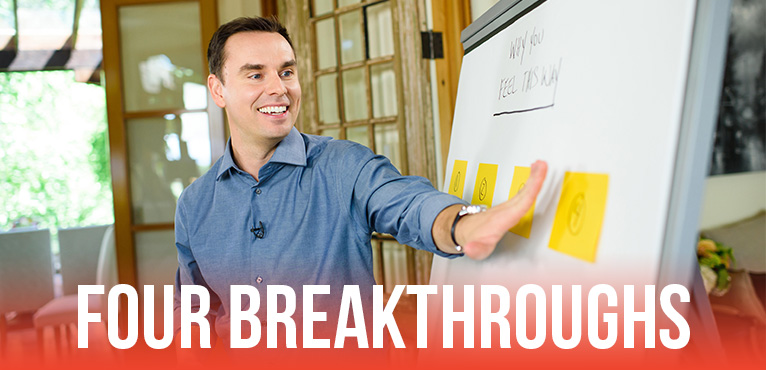SUMMARY
- “When you feel like you have to do it all yourself, that creates an existential, esoteric stress that can’t even be measured. Feeling alone on the path of purpose is suffering. We’re talking about wellness and we can’t achieve it without social support. You need to structure it and you need to do it now.”
- Stress is a natural part of life, so learning how to manage it is essential for our health. Follow these 3 tips to help you release tension, relieve stress, and take command of your wellbeing.
- “We need to have a practice in our life on a regular basis to evaluate where we’re being stressed and why it’s happening and what level of intensity it is. The awareness of what’s causing us stress has been proven in studies to decrease our stress.”
- It’s normal to feel stressed, but do you have trouble releasing it? Learn what’s causing your stress and what you can do to manage it.
- Watch the video to get the full training.
- Already have the High Performance Planner and CRUSHING each and every day? Let’s celebrate you! Take a photo with your planner and use #HPXlife or #TeamHPX.
HOT NEWS & DEALS!
-
Free Book!
My blog readers get a complimentary copy of my new book High Performance Habits, while supplies last! I bought 1000 for you – so no charge for the book itself – but I do ask you pay your shipping. While supplies last. Get yours here.
-
8 Online Courses for $10!
My blog readers also get an exclusive $10 trial to access ALL my personal development courses! Click here for the $10 trial. Students call it “the Netflix of Personal Development.” You’ll call it the curriculum that changed your life forever!
-
High Performance Planner!
This is the 2-in-1 planner and journal achievers use to win the day and accelerate long-term success. Get yours here (while supplies last)!
DID YOU KNOW?
I give weekly prizes, gratitude and shout-outs to our students, so post a screenshot or video on Instagram and use #TheBrendonShow! I can’t wait to hear your thoughts about this episode!
RELATED POSTS
Striving in Chaos: My Daily Routine
Sleep Better: My Evening Routine
When You Feel Horrible (Tired, Bored, Sad)
How to Deal with Stressful Situations
Optimize Your Health and Productivity
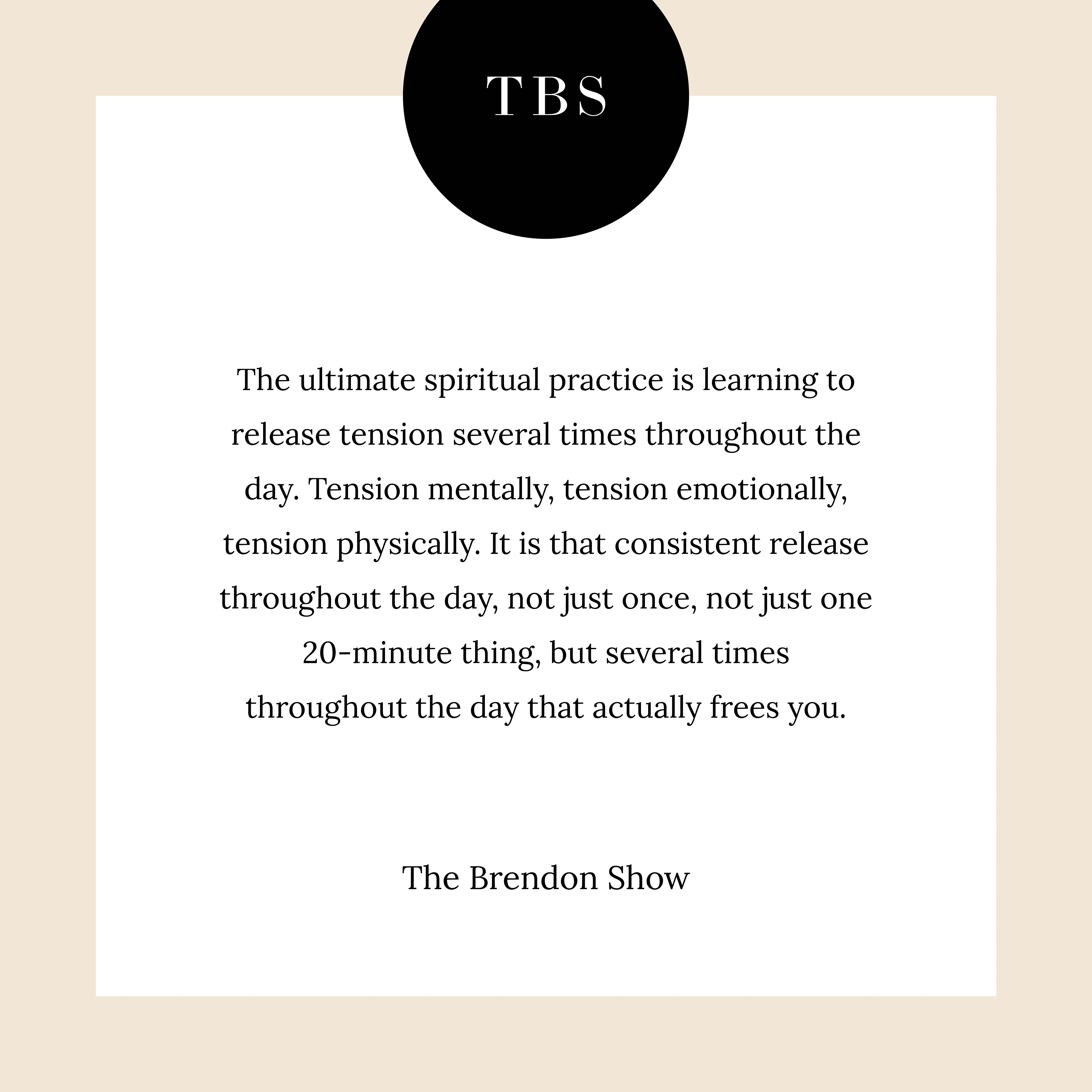
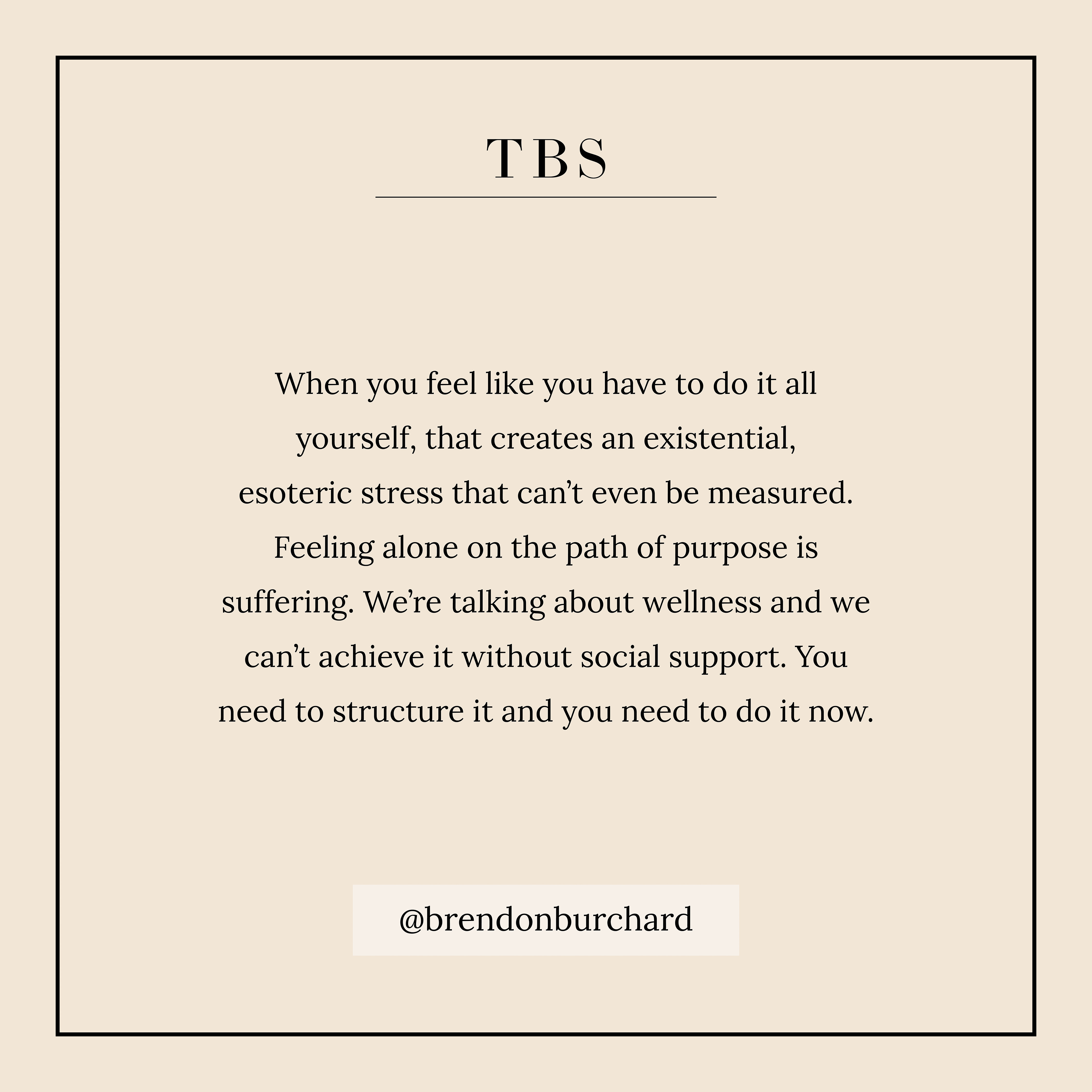
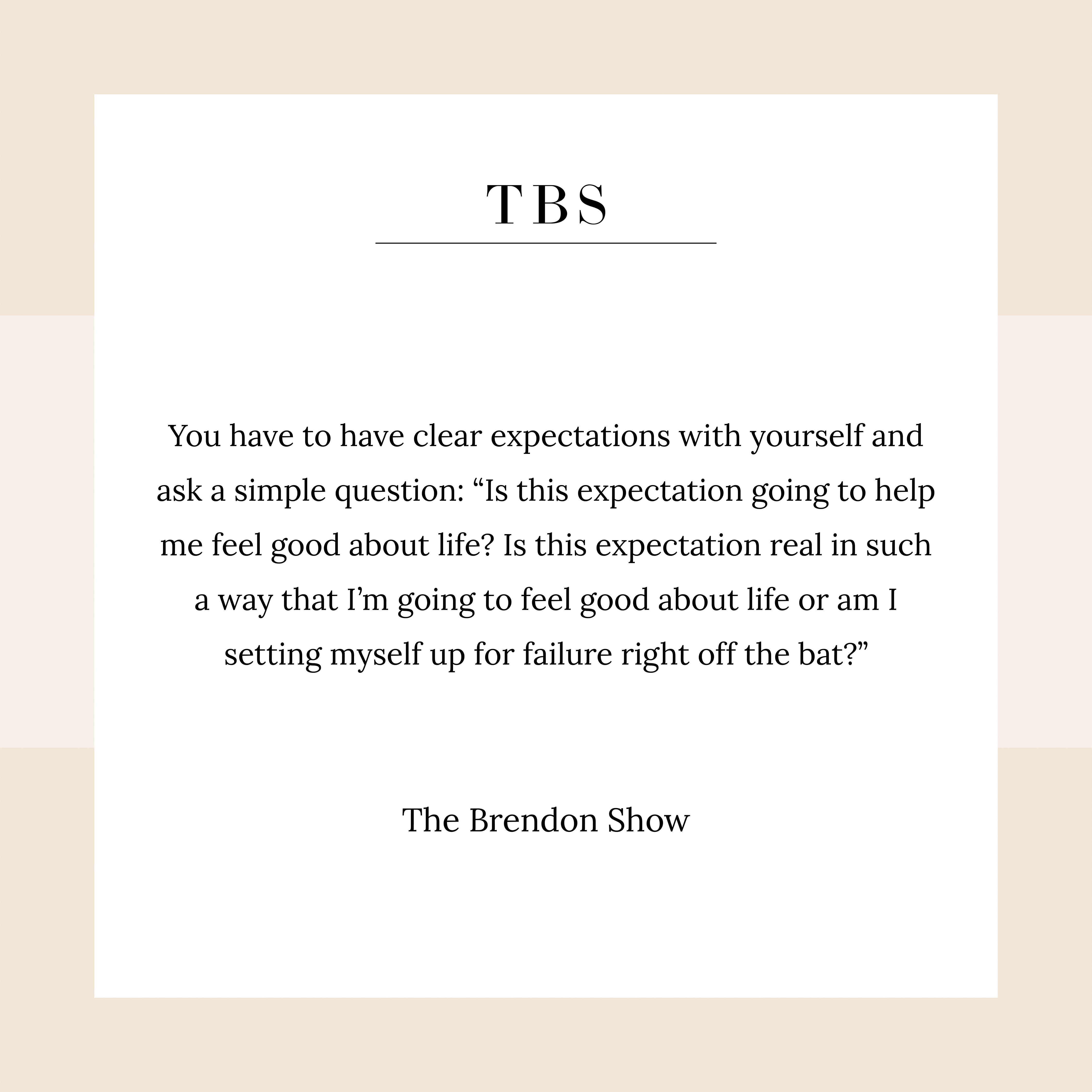
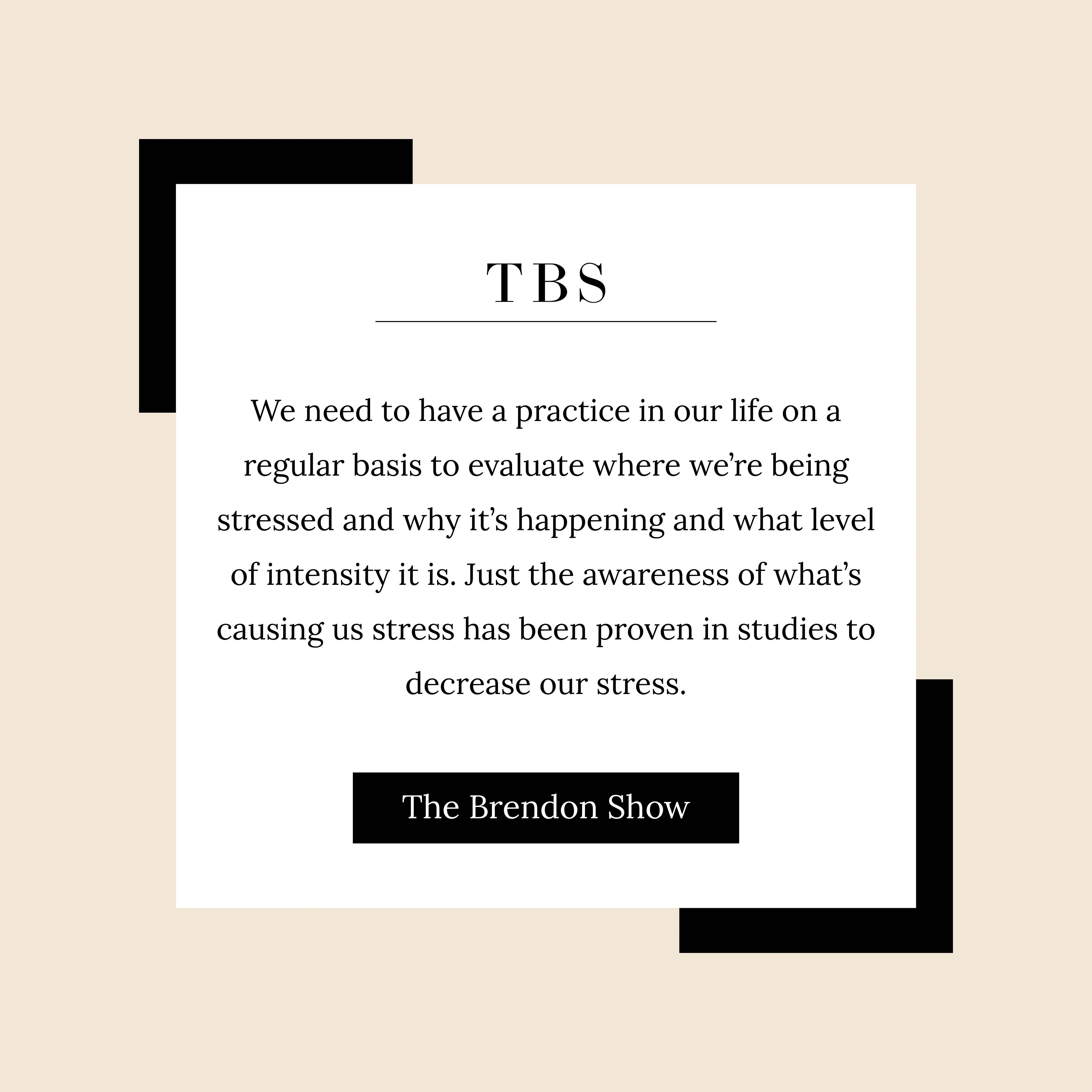
FULL TRANSCRIPT
[The following is the full transcript of this episode of The Brendon Show. Please note that this episode, like all TBS episodes, features Brendon speaking extemporaneously–he is unscripted and unedited. Filmed in one take, The Brendon Show has become one of the most viewed unscripted, direct-to-camera self-help series in the history of YouTube. It has also been the #1 Podcast in all of iTunes and is regularly in the top podcasts in Self-Help and Health categories around the globe. Subscribe to the free motivational podcast on iTunes or Stitcher.)
When you say wellness, the first thing people often think about is their energy, but the second thing they often think about is stress. The reason we get attracted to wellness conversations is because at some point, we got so stressed, it jacked up our health, it jacked up our happiness, and all of a sudden we’re frustrated with life.
So, we had to build wellness practices into our life for better coping mechanisms, right? And so that’s what we’re going to talk about a little bit here, but maybe in a unique way for you because if you’re living in a state of perpetual stress, we know what that does to you. It does things like kill you early. It does things like, I don’t know, lead to higher rates of divorce. It does things like leading to higher rates of recidivism, where you go back to jail earlier if you’re stressed.
Stress leads to some of the worst behaviors in the human condition.
I mean, how many times have you been stressed out and you got flippant with your wife or your spouse? How many times have you been stressed, you forgot to do something really important? How many times when you were stressed, you did not feel like working out, so you turned to comfort food? How many times have you been stressed and it just absolutely murdered a night of sleep—you could not sleep because you were too stressed? You woke up with anxiety, and you doubted yourself.
It is a poison and it’s a natural part of life too, though. So we better learn how to deal with it ’cause stress is never going to go away. So many people think, “Well one day I’ll become so successful, I won’t be stressed anymore.”
I’m like “Yes, when you’re dead.” That’s the only time, up in heaven, that there’s maybe no stress. On this Earth, on this planet and in this time, there will always be something. You could be the most extraordinary human on the planet and you’ll still feel a level of stress. I was in an audience one time and speaking at an event with the Dalai Lama and somebody in the audience asked his holiness, “Do you still feel stress?” And he gave this great belly jolly-hearted laugh. He was just laughing, like he didn’t even have to answer, and everyone knew it was like, of course he still feels it. I mean please. Imagine if you were pushed away from your home country for most of your adult life and the whole world looked to you as a leader and an entire religion and culture saw you as their idol. It’s kind of a pressure situation of course, he’s stressed and of course everyone’s stressed.
People always say to me, “Brendon, do you get stressed?” I’m like, “Do I breathe?” How do we imagine that there are these superhuman souls who don’t get stressed? I think we’ve all been sold this bill of goods, it’s a total falsity. It’s like, oh just be a peaceful warrior. Oh yeah, well go with that peaceful warrior in war and go ahead and strap a heart rate monitor to them and they’ll be peaceful in their mind but their heart will be going like this.
There’s physical stress, there’s emotional stress, there’s like esoteric stress, there’s existential stress. We’re never going to escape every kind of stress.
So what can you do? What’s the way out, Brendon? In this session, I want to introduce you to three simple ideas that will help you so much that are a little counterintuitive. Now I know some of them you know, like if you’re stressed, go do some physical exercise. You’re stressed, go do some meditation. But those things are what I call relieving practices. But there are also things that are more proactive practices that can prevent how much relieving practices you need. Does that make sense?
Stress builds up, so you go release it doing something. I’ll teach you a process for that too, but there’s also some specific things you can do to make sure it doesn’t build up as much or in some cases, at all, in the important areas of your life.
What I’ve discovered is that a lot of people aren’t really aware of where their stressors are, why they exist, and how intense they are.
So what happens? They kind of explode one day. It’s like the stresses are building up like steam in a pipe and you can keep ramming that steam in there but one day, it’s so intense, it explodes. Have you ever exploded on somebody because of your stress? Like you freaked out at somebody at work or you found yourself driving in the car and someone cuts you off and all of a sudden you freak out and you’re like, “That’s not me?”
That was the stress. It had just built up and maybe you were unconscious of it but it kept building up and building up and leading to a bad behavior.
We need to have a practice in our life on a regular basis to evaluate where we’re being stressed and why it’s happening and what level of intensity it is.
And my personal practice in my life, as you know, I do my High Performance Planner every Sunday, and you can do the same thing. Print it out and ask those questions: Where am I being stressed and what’s causing it, what’s going on here?
And if you’ll do that, just that awareness of what’s causing us stress, has been proven in studies to decrease our stress.
Isn’t that funny? It’s just being aware of what it is helps you get clarity. And with clarity comes a little bit of like certainty, and a little bit more of like, “oh, that’s what’s going on for me.”
Have you ever had that? Where you had a couple weird weeks and you’re like, “That’s what’s been going on for me?” And soon as you know what’s been going on, you kind of feel better. Stress is like that. So identify those areas.
And now let’s talk about three big things you can do that you probably never really thought of that will help deal with it and prevent it.
1. Get Clear on Your Expectations
So first big idea, expectations. Most of our stress comes from unrealized or unconscious expectations. We wanted it to go like this, it’s not going like that, it’s frustrating me, it’s stressing me out, right? ‘Cause when you get everything you want, are you stressed? When everything goes just like the way you anticipated, are you stressed? No, you’re like, “This is great.” It’s when your expectations fall apart, when you wanted this, it turned out like that, you weren’t ready for it and now you’re freaked out. So what do we have to do? We’ve got to learn to better manage the expectations in the important parts of our lives. And that is so critical.
So let me give you a way to do that. In every context that you’re about to do, in every goal you’re about to try to achieve, in every project you’re about to start, with your family, at home or at work, what I want you to do is always have a clear conversation about expectations where you share your expectations and you solicit what other people’s expectations are. Going to Disneyland with your hubby and the kids, okay, what happens? All of you go to Disneyland and no one had a conversation up front and now the kids want to go, like in the moment, the kids are tearing your arm off to go over here but your son wants to go over there, your husband’s like, “I’m hungry, I want to eat, I hate this.” And you’re like, “I hate it too,” and you all freak out. You didn’t prepare. You didn’t take just literally that simple thing of like, “Hey, husband, we’re going to Disneyland today, what would you like to experience today? How would you like this to go? Hey, Suzie, we’re going to Disneyland today, how do you want this to go? What would you love about today?”
These pre-conversations of expectations save misery later. People don’t do it. You get your team together, hey, let’s go take on this brand new project and everyone starts bum rushing the project but no one said, “Okay, what’s your expectation? What are you supposed to do, what am I supposed to do? What’s the deadline, what’s the date? Who’s in charge of what?”
And so what ends up happening is this big rat’s nest happens and now everyone’s frustrated. “Why are you doing this? Why are you messing with this? Get out of my way.” Now everyone’s trying to set boundaries later, everyone’s trying to have the conversations later, the deadlines are missed, everyone’s just completely upset. Why? No pre-expectation conversation. You’ve got to think about whatever you’re about to do to do that. And here, let me tell you the easiest and the most fundamental and the most important area to do this in is in your relationship. If you have a relationship with your significant other, your intimate partner, your lover, your spouse, oh my gosh, please do this simple thing.
On Sunday, look at the week ahead, sit down with your spouse, your partner, significant other, and just say, “Hey, honey, here’s what I have coming up this week and here’s what I’m kind of hoping for here. What do you have coming up this week? What are you hoping for?” Because when you both know the expectations that each other has for the week, you can support each other, you can cheer each other on and now, when the expectations go sideways, you have a little bit of camaraderie to be like, “Oh, honey, remember that meeting, I wanted this to happen, it didn’t go well,” and she’s like, “Yeah, oh my gosh, I’m so sorry, I know you wanted it to go like that, it didn’t go well?”
And now you’ve got empathy and sympathy and compassion, you have a comrade as you’re trying to achieve things. One reason stress can really overtake our life is because we approach our life solo. We just kind of bumble into things without clear expectations and without a comrade and now things turn sideways. So I’d sure love for you to think about areas that are stressing you out and now how you can more explicitly communicate in that area?
Setting boundaries is all about explicit communication.
Dealing with stress, same thing, but the bend here, the focus here, is expectations. What are your expectations? This also brings up something that’s really important: unrealistic expectations. How many of us want everything to go absolutely perfect and every time it falls apart, we fall apart? We didn’t get what we want and now we’re so stressed, so upset, so angry, and that upset and anger spills out onto the people that we really care about. It’s a real problem.
And so you got to sit down and have real clear expectations with yourself and also ask just a simple question, “Is this expectation going to help me feel good about life? Is this expectation real in such a way I’m going to feel good about life or am I setting myself up for failure right off the bat?”
Because if you’re setting yourself up for failure over and over and over again, no wonder you’re so stressed.
Okay, so if the first idea, clear expectations, have the pre-con conversations before you go in the meetings, with the teams, with your spouse, everybody, clear expectations, that decreases stress later on.
2. Release Meditation Technique
Number two, let’s think about number two as a physiological approach to dealing with stress. So number one was kind of like psychological, I’m getting clear about expectations. Number two is more physiological and what I’d love to introduce you to is this concept of dealing with stress called the Release Meditation Technique.
Okay, if you haven’t heard about RMT, it stands for Release Meditation Technique. So RMT is a way of releasing stress in your life. And it’s just a simple mantra-based meditation. I’ve been doing it 15 years maybe, something like that, and what I do is several times throughout the day, for me, usually it’s about three times throughout the day, I’ll push back from my computer or I’ll excuse myself from that meeting or I’ll take a minute to myself and I’ll close my eyes and I do two things in the Release Meditation Technique. Number one is I try to release the tension in my body. So I might sit down, might lay down, I’ll close my eyes and I just focus for a minute or two of releasing the tension in my legs, my feet, in my hips, in my stomach, in my shoulders, my arms, in my neck, in my eyes, in my brows and I’ll just try to release a little bit of tension.
Second thing I do is I try to release thoughts. So that’s what takes me in a traditional meditation is where I go into a mantra-based meditation and for me, the mantra is literally the word release. So I close my eyes, and I repeat to myself release, release, release, release and as I’m saying the word release, my intention in that moment is to release that tension in my body and to release the thoughts that are coming up.
And as more thoughts come up, I just let them fly by by returning to my mantra release. And I do that over and over and over again, sometimes I do it two minutes, sometimes it’s 10 minutes, sometimes it’s 20 minutes. On my A-game, the days I know I’m like the best of who I am, I do two 20-minute sessions of release meditation. Now, I’ll be totally honest with everybody, and I know you have your own wellness practices too, that maybe you’re not always consistent about as you want to be, I always get one 20-minute session in and maybe 40% of the time get two in. But what I contract is the 40% of the time when I get two in, I feel better the next day because stress is something that accumulates, it just builds and it builds and it builds. So you need a consistent process of releasing that tension.
One thing I teach a lot of my high level, highly creative people is I say, here’s what I’d love you to do, I’d love for you between every activity, let’s say you’re doing email and now you need to create a keynote or a PowerPoint presentation, between every major activity, I want you to push away from the desk, close your eyes, do the release meditation for two minutes, just release, release, release and then before you open your eyes, set an intention for how you want to do the next thing well.
Because here’s what that does—a lot of our stress is carried over from previous activities. Your three o’clock stress isn’t really just because what happens at three o’clock. Your three o’clock stress is the accumulation of 10 a.m., 11, noon, one, 70 emails, 40 DM’s, four phone calls, the kids screaming, that’s what’s building up at that three o’clock. And so once you realize stress is an accumulation, you go, “You know what, then several times throughout the day, I’d better be dumping it, let it go, release it.” And that is the ultimate spiritual practice.
We think one day we’re going to go on top of the mountain and meditate for 10 days and that’s going to release everything—no—because we’re going to go back down, back in the valley, back in the hard work, back in the challenge, back in the suffering, back into the obligations, and Monday is going to hit and we’ll feel stressed again ’cause it builds.
The ultimate spiritual practice is learning to release tension several times throughout the day. Tension mentally, tension emotionally, tension physically. It is that consistent release throughout the day, not just once, not just one 20-minute thing, but several times throughout the day that actually frees you.
And that’s why I like to tell people to do it between activities. I do that all the time. I might, let’s say, maybe I’m writing one of my books. I’ve been working on that for an hour or two, three, but now I need to do some phone calls. Before I do the phone calls, I might sit up, stand, bounce in place a couple times, close my eyes, bounce in place, take 10 deep breaths, sit down, repeat the word release to myself several times and then ask, how do I want these phone conversations to go? What’s my expectation going into these phone conversations? Oh yeah, this is what I’m after. Let me make sure I clearly communicate that. Okay good. And it’s that break in between activities that gives you sanity. When you feel like you’re losing your mind, you know why? No break. Isn’t it true? You feel like you’re kind of losing your mind because there was no break. You did 79 activities with no break and you’re about to lose it. The pipe is building up, ready to burst. So do release meditations, release techniques throughout several activities throughout the day.
3. Know You Don’t Have to do it All
Okay, that’s the second big idea. First idea, clear expectations. Second idea, release activities. Whatever that has to be for you, several times throughout the day or in between activities. And then the third big release is the release of feeling like you have to do it all yourself. This piece is about getting really strategic in one area. And that is, I want you right now to identify: What is the biggest outstanding dream or ambition you still have in your life? What is that next big thing you so want, you so desire, you so want to climb up and achieve? What’s that next thing, the next big thing?
Because here’s why the last big thing was so hard. You went at it too alone. You thought you had to figure it out, you had to push all the buttons, you had to manage all the people, you had to earn all the money, you had to take all the responsibilities, you had to do everything. That’s why that climb was so dang long and so dang hard. This time, you’re going to take that track and say, that’s what I want. And I want you to immediately structure it so you have support from day one.
For some of you, that means today you’re going to go on the internet and you’re going to hire your very first virtual assistant. For some of you, that’s going to go home, you’re going to go home and say, honey, I know we want to go here. I need your help. So you’re going to do these activities and I’m going to do these activities. Does that sound smart? How should we divvy this up? And you’re going to divvy it up right off the bat, not wait to do it. That might mean you go into your team and say, team, I need to delegate 40% of my activities now to you and I need to know that you got it, here’s your quarterly goal.
But you need to structure up the support for this next climb. Because you know what, in advance when you know you have support on the climb, you are way less stressed. When you feel like you have to do it all yourself, my friend, that creates an existential, esoteric stress that can’t even be measured. Feeling alone on the path of purpose is suffering.
Feeling alone, even if you’re doing good things, doesn’t feel good. We’re talking about wellness here. We’re talking about your well-being and we can’t achieve it without social support. But you need to structure it and you need to do it and you need to do it now.


